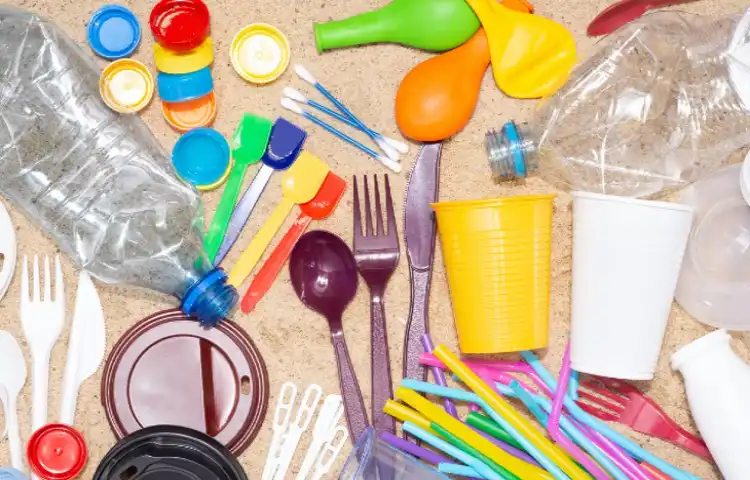

Single-use plastic banned in India from today. (Photo for representation)
<p>
The ban on single-use plastics by the Centre in order to reduce pollution in the ecosystem comes into effect nationwide from today.&nbsp;</p>
<p>
Single-use plastics are items that are discarded after being used only once and instead of going into the recycling process end up in garbage heaps in cities or river beds and beaches.</p>
<p>
These single-use plastics have been identified as the biggest menace to the ecosystem and include items such as earbuds with plastic sticks, plastic sticks for balloons, plastic flags, candy sticks, ice-cream sticks, polystyrene (thermocol) for decoration, plates, cups, glasses, plastic cutlery such as forks, spoons, knives, straw, trays, wrapping or packing films around sweet boxes, invitation cards, and cigarette packets, plastic or PVC banners less than 100 microns and stirrers.</p>
<p>
Directions have been issued to e-commerce companies, the leading user of single-use plastics, as well as plastic raw material manufacturers to phase out such items.</p>
<p>
A National Control Room has been established in the Central Pollution Control Board to monitor the enforcement of the ban. States have been asked to undertake comprehensive awareness activities including social media campaigns, interactive meetings with industries, colleges, schools and other institutions.</p>
<p>
The state boards have further been directed to intensify inspections of industrial and commercial establishmenst for effective implementation of the ban.</p>
<p>
In line with Prime Minister Narendra Modi&rsquo;s announcement to phase out single use plastic items by 2022, the environment ministry had notified the Plastic Waste Management Amendment Rules, 2021, on 12 August 2021.</p>
<p>
Carrying forward the spirit of &#39;Azadi ka Amrit Mahotsava&#39; — 75th year of Independence, a defining step to curb pollution caused by littered and unmanaged plastic waste is being taken by the country.</p>
<p>
Several industry stakeholders had earlier argued that India has a low capacity of producing alternative solutions to the banned items.</p>
<p>
To ramp up the production, capacity building workshops are being organized for industry units to provide them technical assistance for manufacturing of alternatives to banned single use plastic items with the involvement of various government agencies. Provisions have also been made to support such several enterprises in transitioning away from the banned single use plastics.</p>
<p>
Earlier, the government prohibited manufacture, import, stocking, distribution, sale and use of plastic carry bags having thickness less than seventy-five microns with effect from 30 September, 2021, and having thickness less than thickness of one hundred and twenty microns with effect from December 31, 2022.</p>
<p>
<strong>Also read: <a href="https://www.indianarrative.com/culture-news/tweet-by-year-old-climate-activist-from-manipur-forces-cleaning-up-of-taj-mahal-area-179673.html">Tweet by 10-year-old climate activist from Manipur forces cleaning up of Taj Mahal area</a></strong></p>
India's National Disaster Response Force (NDRF) team has begun rescue operations under Operation Brahma at…
Prime Minister Narendra Modi on Monday extended greetings on the occasion of Eid-ul-Fitr. Taking to…
Prime Minister Narendra Modi is set to visit Jammu and Kashmir's Udhampur district to inaugurate…
Rescue efforts are underway in Myanmar after a devastating 7.7-magnitude earthquake struck the country, killing…
Taiwan detected one sortie of Chinese aircraft, eight Chinese vessels and one official ship until…
Baloch activist Mahan Baloch delivered a powerful intervention that shed light on the ongoing human…